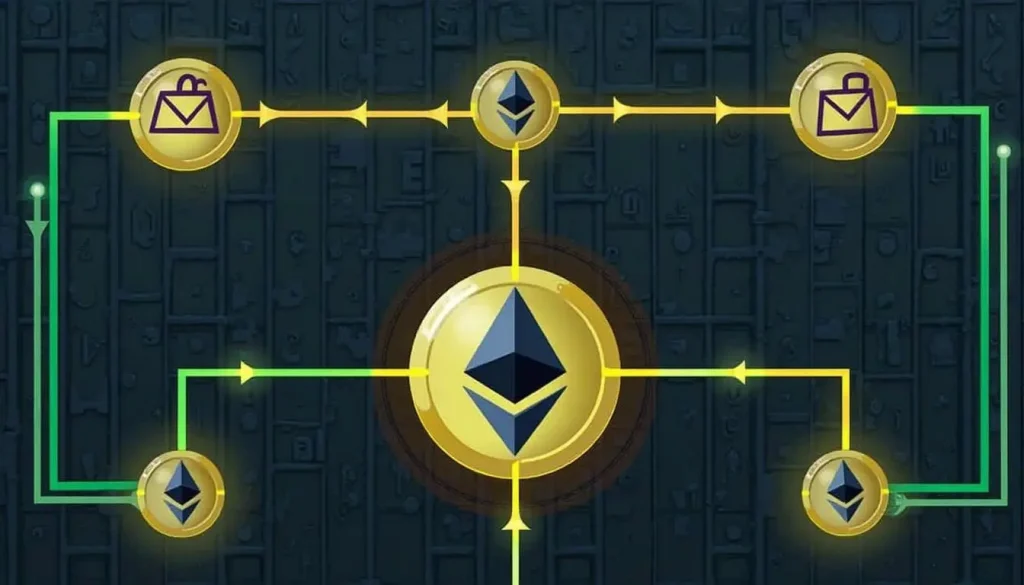Did you know that Ethereum smart contracts handle billions of dollars worth of transactions every day?
It’s fascinating how these self-executing contracts are changing the way we think about agreements and transactions.
Ethereum smart contracts are essentially programs that run on the Ethereum blockchain.
They automatically execute actions when predefined conditions are met, cutting out middlemen and reducing the risk of fraud or error.
This makes them a game-changer for anyone involved in finance, real estate, or any industry where trust and transparency are paramount.

What Are Ethereum Smart Contracts?
Ethereum smart contracts are like digital vending machines. Imagine you want a soda; you put in your money, press a button, and voilà!
The machine dispenses your drink without any human involvement. Similarly, these contracts automatically execute actions when certain conditions are met.
These self-executing agreements live on the Ethereum blockchain—a decentralized platform that’s as secure as Fort Knox but way cooler because it’s all digital.
No need for a middleman or lawyer to verify transactions; the code does it all.
Let’s break down how smart contracts work with an example.
Say you’re buying a concert ticket from someone online. Instead of sending money and hoping they send the ticket, you’d use a smart contract. You’d pay into the contract, which holds your funds until it verifies that you’ve received your ticket. Once everything checks out, the contract releases the payment to the seller.
Why is this important?
It eliminates fraud and reduces errors—no more worrying about getting scammed by some sketchy character on Craigslist.
Ethereum isn’t just for financial transactions; its use cases span various industries like real estate and supply chain management. Think about decentralized applications (dApps) running on Ethereum—these apps operate without downtime or interference thanks to their underlying smart contracts.
Ever wonder what happens during an Ethereum transaction process?
It’s pretty straightforward yet fascinating: once specific conditions coded into the contract are met, bam! The transaction is executed automatically.
In my journey exploring crypto, I’ve seen how these contracts can simplify complex processes while boosting trust and transparency in dealings across different sectors.
So next time someone asks you “Smart contracts explained?” just tell them it’s like having a robot lawyer who never sleeps and always follows through.
How Ethereum Smart Contracts Work
So, now that you know a bit more about about Ethereum smart contracts, you might still be wondering, “How do these digital wizards work?”
Let me break it down for you in plain English.
Smart Contract Code
A smart contract is a bit like a robot that lives on the Ethereum blockchain.
It’s made up of code—think of it as a set of instructions. This code does specific things when certain conditions are met. For example, if I promise to pay you $50 once you deliver my pizza, the smart contract will hold that $50 until the pizza arrives at my door piping hot.
But here’s where it gets interesting: once created and deployed (more on that in a second), this little robot is unchangeable.
No sneaky edits or take-backs allowed! Think about it like carving something into stone but way cooler because it’s all digital.
Execution on the Ethereum Blockchain
How do these little robots get to work?
First off, deploying them isn’t free—you need gas (Ethereum’s version of fuel) to send your contract into the wild. Once there, they live at a unique address on the blockchain.
When conditions are met, bam!
The contract executes automatically without needing anyone to push buttons or flip switches. Imagine having an invisible butler who follows orders exactly as written with zero room for error. And since everything is stored on the blockchain—a super secure public ledger—there’s no funny business either.
Benefits of Ethereum Smart Contracts
Ethereum smart contracts are pretty cool. Imagine not needing a middleman to make sure everyone sticks to their promises—it’s like magic, but real and on the blockchain.
Transparency
You can see everything with Ethereum smart contracts.
They’re stored on a public blockchain, so anyone can check out the terms and conditions. It’s like having all your cards on the table in poker; there’s no hiding anything. Everyone involved can trust these contracts because they can’t be changed once they’re up there for the world to see.
Security
These contracts are super secure. They’re encrypted and live on a decentralized ledger, which is tech talk for “really hard to mess with.”
If someone wanted to hack it, they’d have to change every single block in the chain—a nearly impossible task! So you can sleep easy knowing your transactions are safe.
Efficiency
Smart contracts save time and headaches. They automatically execute when conditions are met, cutting out the need for third parties or endless paperwork.
Think of it as having an invisible assistant who never forgets anything and always gets things done right away. This efficiency speeds up processes in industries like real estate and supply chain management, making life easier for everyone involved.
Popular Use Cases for Ethereum Smart Contracts
Ever wondered what makes Ethereum so cool? Let’s jump into some popular use cases of Ethereum smart contracts, and trust me, it’s more exciting than it sounds!
Decentralized Finance (DeFi)
Decentralized finance, or DeFi for short, is like the Wild West of finance.
Picture this: lending platforms where you can borrow and lend assets without dealing with banks. No middlemen!
For example, platforms like Aave use Ethereum smart contracts to make this possible. Then there are stablecoins—cryptocurrencies that keep their value steady by being pegged to fiat currencies like the US dollar.
These stablecoins are created using—you guessed it—smart contracts! And don’t forget decentralized exchanges (DEXs) like Uniswap. They let you trade cryptocurrencies directly with others, no permission is needed.
Supply Chain Management
Supply chains can be a nightmare of paperwork and inefficiency.
But throw in some Ethereum smart contracts and things get interesting. Imagine inventory management that’s automated and transparent! Smart contracts track every item in real-time, ensuring nothing gets lost or misplaced.
Payments and settlements also become a breeze; they happen automatically when conditions are met, cutting out the need for intermediaries who just slow everything down.
Digital Identity Verification
Now let’s talk about something that’s both important and super boring: identity verification. It’s a necessary evil but oh-so-tedious with traditional methods.
Enter Ethereum smart contracts! They can create digital identities that are secure yet easily verifiable.
Think of it as having your bouncer who only lets the right folks through the door but never takes a break or asks for bribes.
So there you have it! Whether it’s transforming finance, streamlining supply chains, or making identity checks less painful, Ethereum smart contracts have some pretty nifty uses.
Challenges and Limitations
Ethereum smart contracts are cool, but they’ve got their quirks. Let’s jump into a few of these hiccups.
Scalability Issues
Ever been stuck in a long line at your favorite coffee shop? That’s kind of how Ethereum sometimes feels.
When too many transactions hit the network, things slow down. Right now, the platform can only handle about 15 transactions per second.
Compare that to Visa’s thousands per second, and you see the problem. They’re working on fixes like layer-two protocols (think of them as express lanes) and sharding (basically breaking up data into smaller pieces), but it’s still a work in progress.
Legal and Regulatory Hurdles
Imagine trying to explain Ethereum smart contracts to your grandparents. Now imagine doing that with lawyers and regulators who barely understand the internet.
Yeah, it’s tricky.
Legal frameworks haven’t caught up yet, which means there’s confusion about whether these digital agreements are even enforceable in court. Plus, different countries have different rules, making global adoption kind of like herding cats.
Security Vulnerabilities
So here’s a scary thought: what if someone finds a bug in your contract? Unlike finding a typo in an email, this could mean losing millions of dollars instantly.
There have been famous hack events where people exploited vulnerabilities in smart contracts to siphon off huge amounts of money — remember The DAO hack? It’s like locking your front door but leaving all your windows open; not ideal for security.
Future of Ethereum Smart Contracts
When I first heard about Ethereum smart contracts, they sounded like something straight out of a sci-fi movie. But here we are—living in a world where these digital agreements can do everything from lending money to automating supply chain logistics.
So, what’s next for these nifty little programs?
Enhancing Security
Ever worried about hackers breaking into your crypto wallet? Me too!
That’s why there’s a huge focus on making Ethereum smart contracts more secure. Researchers are working on vulnerability detection methods like static and dynamic code analysis.
They’re like detectives sniffing out bugs before the bad guys find them.
And get this—machine learning is now part of the game. Imagine a robot Sherlock Holmes finding vulnerabilities you didn’t even know existed!
This tech helps address class imbalance issues and unknown threats that could wreak havoc if left unchecked.
Improving Efficiency
Let’s talk gas—not the kind you put in your car but the fees you pay to run these smart contracts. Ever feel like you’re spending way too much on gas fees? You’re not alone.
Developers are cooking up ways to optimize gas usage using techniques with fancy names like parametric gas bounds and gas upper-bounds synthesis.
In simpler terms, think of it as budgeting for groceries so you don’t blow through all your cash halfway through the month. These innovations aim to prevent those dreaded “out-of-gas” errors that can halt transactions right in their tracks.
Scaling Up
Remember when Netflix used to buffer every five minutes?
That’s kinda how Ethereum feels sometimes when it’s congested. The network struggles under heavy loads, slowing down transactions and jacking up fees—a real bummer for everyone involved.
But hey, there’s hope! Solutions like sharding (splitting the blockchain into smaller pieces) and layer-2 scaling (building on top of Ethereum) promise to make things smoother than ever.
It’s like upgrading from dial-up internet to high-speed fiber—you won’t miss those buffering days!
Key Takeaways
- Automation and Security: Ethereum smart contracts automatically execute transactions when predefined conditions are met, reducing the need for intermediaries and minimizing fraud or error.
- Decentralization: Operating on the Ethereum blockchain, these self-executing contracts offer high security and transparency by utilizing a decentralized ledger.
- Wide Applications: Beyond financial transactions, Ethereum smart contracts have diverse applications in industries like real estate, supply chain management, and digital identity verification.
- Scalability Challenges: Currently, Ethereum faces scalability issues, handling only around 15 transactions per second compared to Visa’s thousands. Solutions like layer-two protocols and sharding are being developed to address this.
- Legal and Regulatory Hurdles: The legal framework for smart contracts is still evolving, creating uncertainty about their enforceability across different jurisdictions.
- Future Enhancements: Efforts are underway to improve the security, efficiency, and scalability of Ethereum smart contracts through advanced technologies like machine learning and optimized gas usage techniques.
